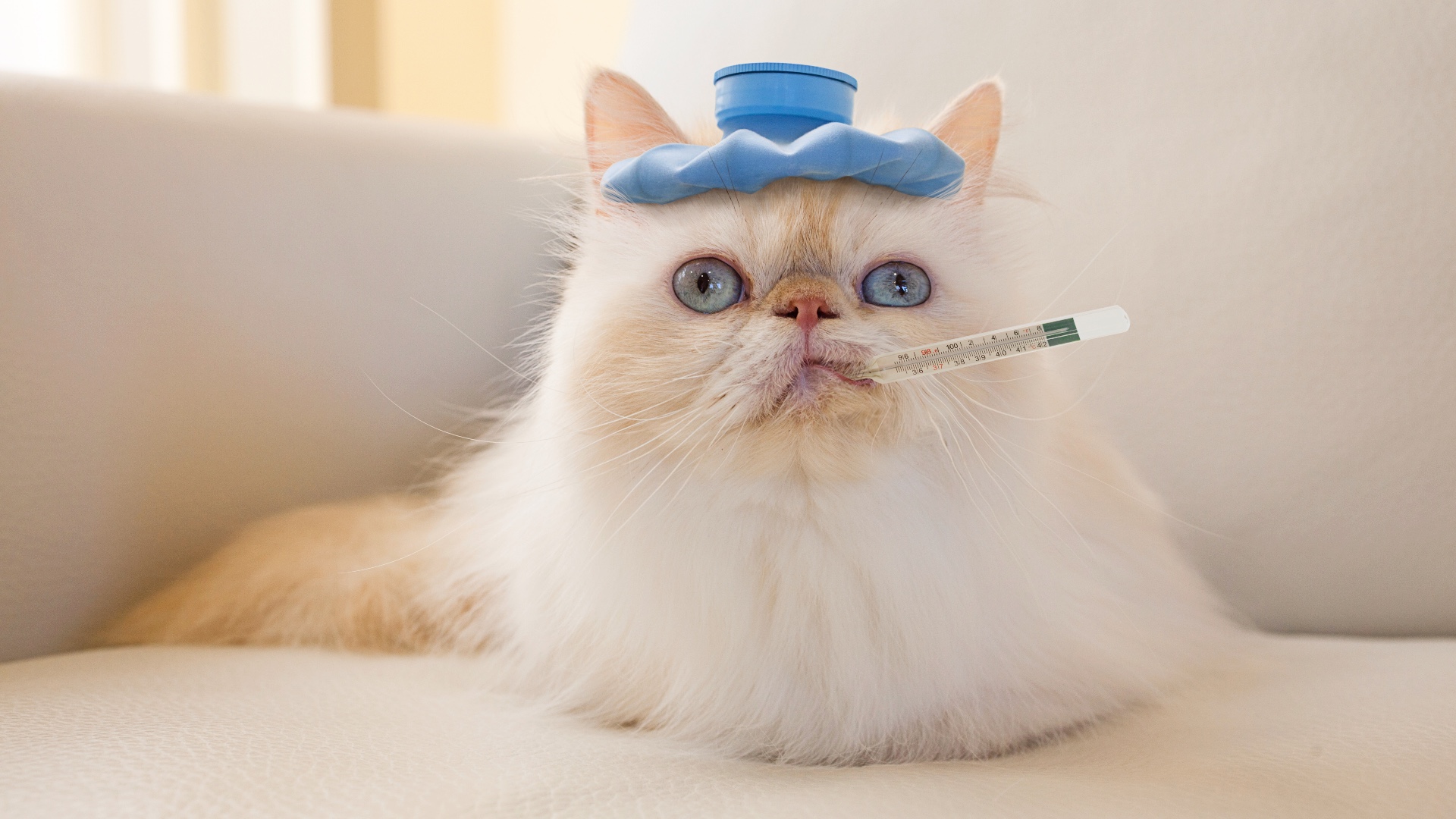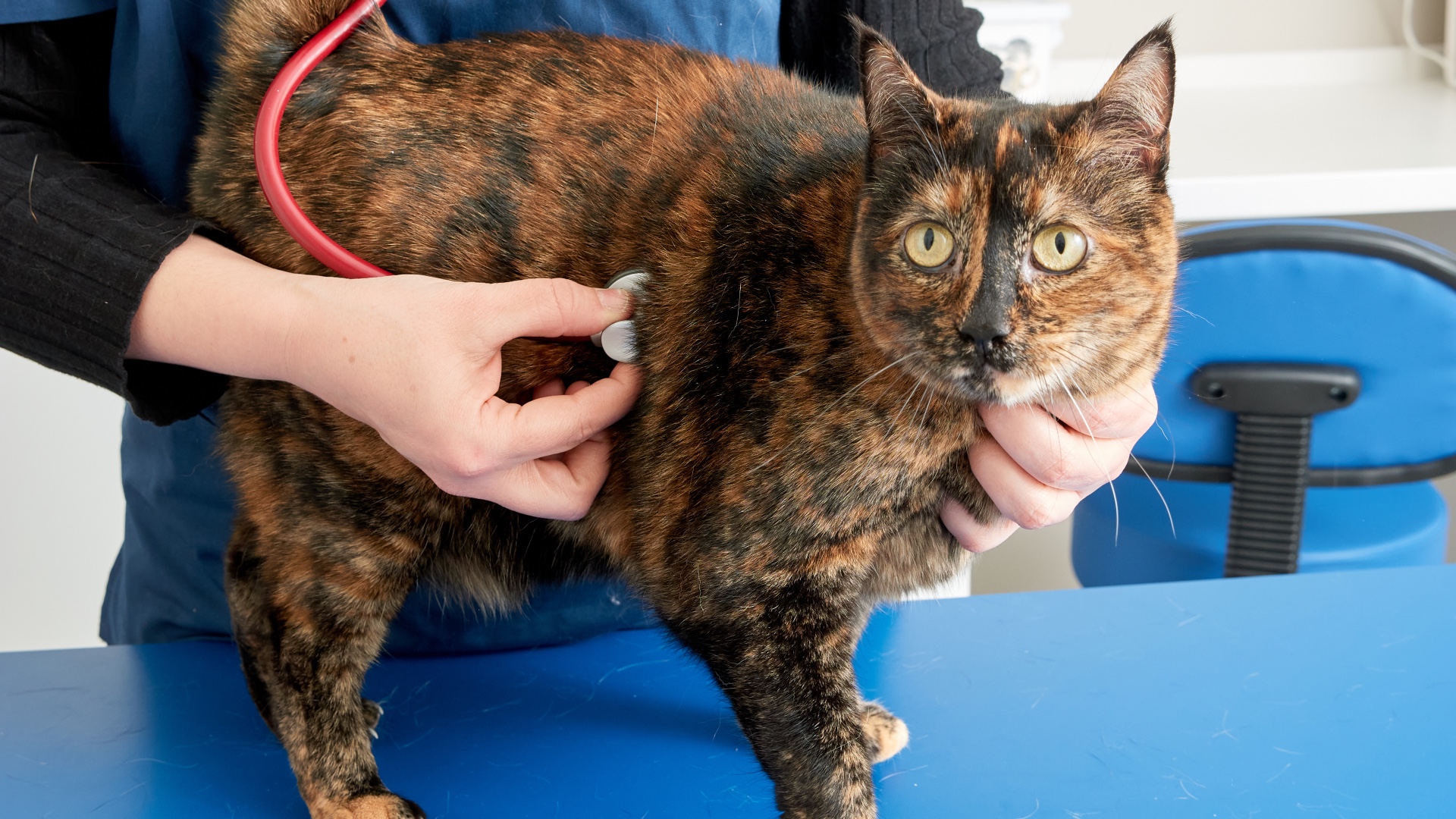Why is my cat coughing?
Got a coughing cat? Find out why your cat is coughing and how to help

Get the best advice, tips and top tech for your beloved Pets
You are now subscribed
Your newsletter sign-up was successful
If you’ve got a feline friend, it’s likely the question “why is my cat coughing?” has come up more than once. Just like us, cats can cough for a number of reasons, from the relatively benign to the more serious. Working out why your cat is coughing is the first step in helping them to recover, but it’s likely you’ll need to see a veterinarian for a proper diagnosis of a cat cough. Let’s look at what makes cats cough, and when you should worry.
How to tell if your cat is coughing
This might seem like a silly point to make, but the first step is making sure your cat is coughing, not regurgitating a hairball, sneezing, or making any of several other similar-sounding noises. Determining that your cat is coughing will help you and your vet to narrow down on exactly what is wrong with your cat.
A cat’s cough is generally quiet and more wheezy than hacking. They usually crouch in position, extend their head and neck, and expel the air quickly. A coughing cat will usually cough several times in quick succession, then take a small break. In comparison, a cat coughing up a hairball will often be sitting or standing, their ‘cough’ sounds wetter, and the force of their cough increases until the offending object is out.
If you aren’t sure that your cat is definitely coughing, take a video to show your vet – it can be very helpful!
Why is my cat coughing?
So, what causes cats to cough? Any irritation to the lungs or airways can cause a cat to cough. Examples include inhaled irritants (such as cleaning materials or smoke) and allergens causing asthma. Problems causing irritation from the inside (such as lungworms, a large heart, or tumors) can also cause a cough. Cats may also cough if their collar has irritated their trachea. Infections such as pneumonia can also be to blame.
Your vet will use your cat’s age, other health complaints, history, and result of a clinical exam to narrow down these options. A chest x-ray can also be helpful, and your vet might take samples from your cat’s airways to look for abnormal cells or an allergic response.
What should I do if my cat is coughing? Is cat coughing an emergency?

Whilst cat coughing itself isn’t a sign of an emergency, it often comes along with respiratory distress, which requires urgent treatment. If your cat is:
Get the best advice, tips and top tech for your beloved Pets
- Continuously coughing without a break
- Breathing harder than usual
- Breathing faster than usual
- Lying or crouching with their elbows out to each side to make more room for their chest
- Visibly breathing in and out (‘biphasic’ breathing)
- Panting
- Going blue/grey
- Behaving strangely, withdrawn, or lethargic
Then you should call the nearest open veterinary practice and explain the nature of the emergency.
On the other hand, if your cat has started coughing but seems fine in between episodes, your appointment can wait until your usual vet is open. It’s still best to get them seen within two days, and you’ll need to keep a close eye in the meantime, as these cats can deteriorate quickly.
How to treat a coughing cat
If your cat’s breathing is poor, they’ll need oxygen whilst your vet works out what is going on and how they can help. Most cats benefit from a hands-off approach to oxygen, as handling increases stress and makes them worse, so your cat will usually be placed in a special kennel that receives a high oxygen flow whilst your vet formulates a treatment plan depending on the cause of the cough.
For some cats, simple changes such as different cleaning products or a different collar may help. Cats with asthma and allergies are likely to need some changes at home, as well as medication to help them cope with flare-ups. When heart disease is involved, lifelong medication may be necessary. Antibiotics and steroids are commonly used in coughing cats.
Feel free to talk to your vet about difficulties medicating your cat, whether this is because you struggle to give them medication or because of your lifestyle. A treatment plan will only work if you can get the medications into your pet regularly, so your vet will work with you to find a solution that works for everyone.
How can I treat my cat’s cough at home
In the first instance, it’s best to take your coughing cat to the vet for a diagnosis. This is because, apart from the rare instances where a cat is coughing purely due to a too-tight collar, most of these diseases can cause other breathing problems and quickly become an emergency.
However, once your vet has given you a treatment plan, there are some things you can do that might help a coughing cat at home.
- Humidifying the air can reduce irritation and help to treat a coughing cat
- Maintaining a healthy weight can reduce pressure on the airways
- Switching to dust-free litter, reducing the use of household chemicals, and preventing access to secondhand smoke can all reduce coughing in cats
Over-the-counter (OTC) human cough medicines are not recommended for cats. Not only are they ineffective, but they can also contain ingredients that are toxic to cats.
Cats can cough for a number of reasons, from the mild to the serious. However, because cats are so adept at hiding signs of distress it’s sensible to involve a vet as soon as you notice a problem. Coughing cats can deteriorate quickly if they have subtle signs of respiratory distress, and it’s better to be safe than sorry. Your vet will help you to get to the bottom of why your cat is coughing and work with you to develop a treatment plan, including giving you some advice about home remedies for cats that are coughing.
For more cat behavior help, read: Why is my cat walking in circles?
After graduating as a vet from the University of Nottingham in 2016, Dr. Joanna Woodnutt went on to practice companion animal medicine in the Midlands. She quickly developed a love of consulting and helping clients with medical problems such as dermatology, behavior and nutrition - anything that involved helping clients understand their pets better.
Jo started writing about pet health in 2017, realizing that it meant she could help even more pet parents. Since then, she has written for countless online and print publications and is a regular contributor for Edition Dog Magazine. Jo is the director of The Veterinary Content Company, which she founded in 2020. She is also the founder of Petlearnia, a platform that provides pet e-learning courses for pet parents.
Jo now lives in the Channel Islands with her husband Ian and terrier Pixie.

